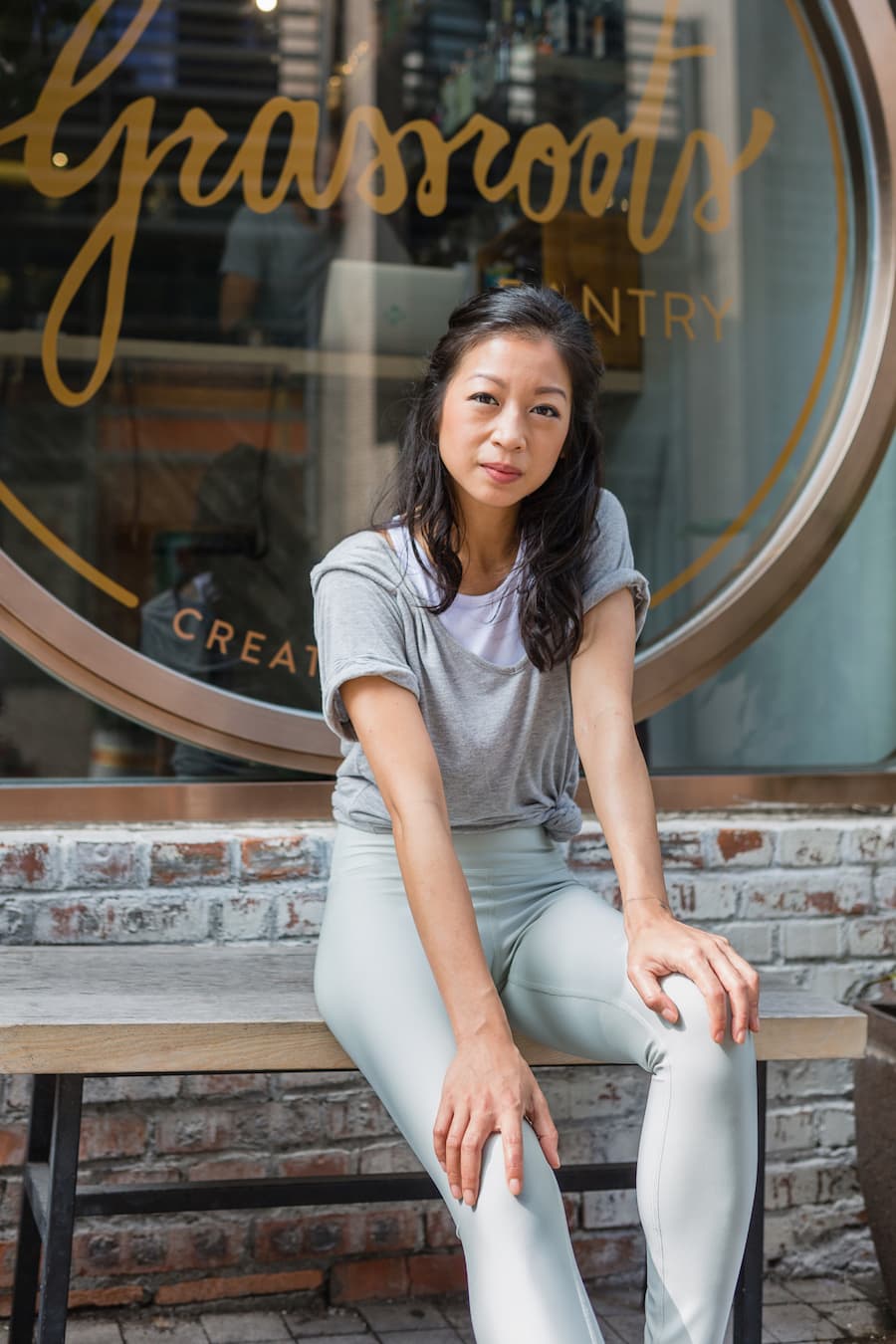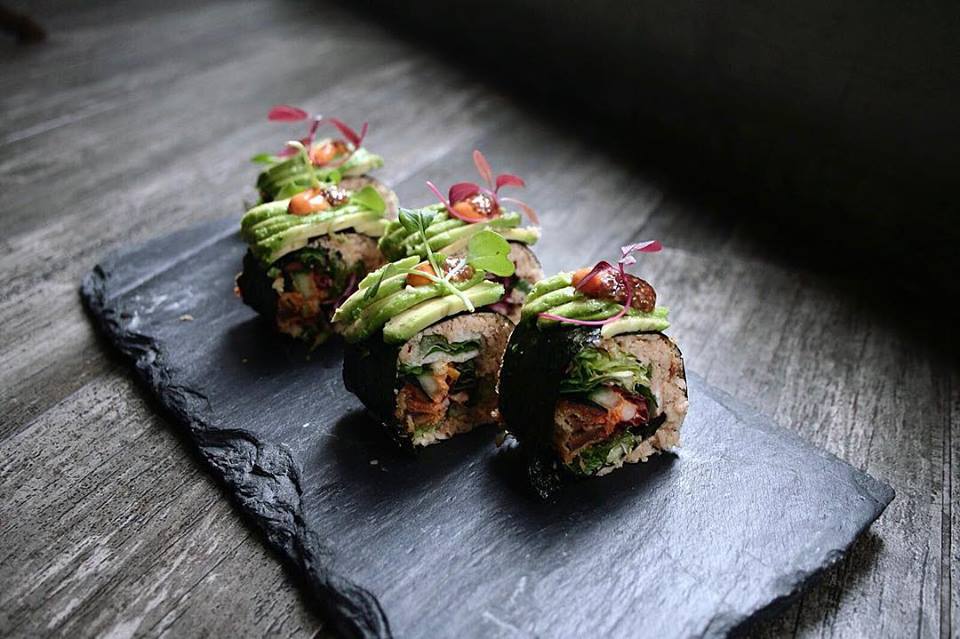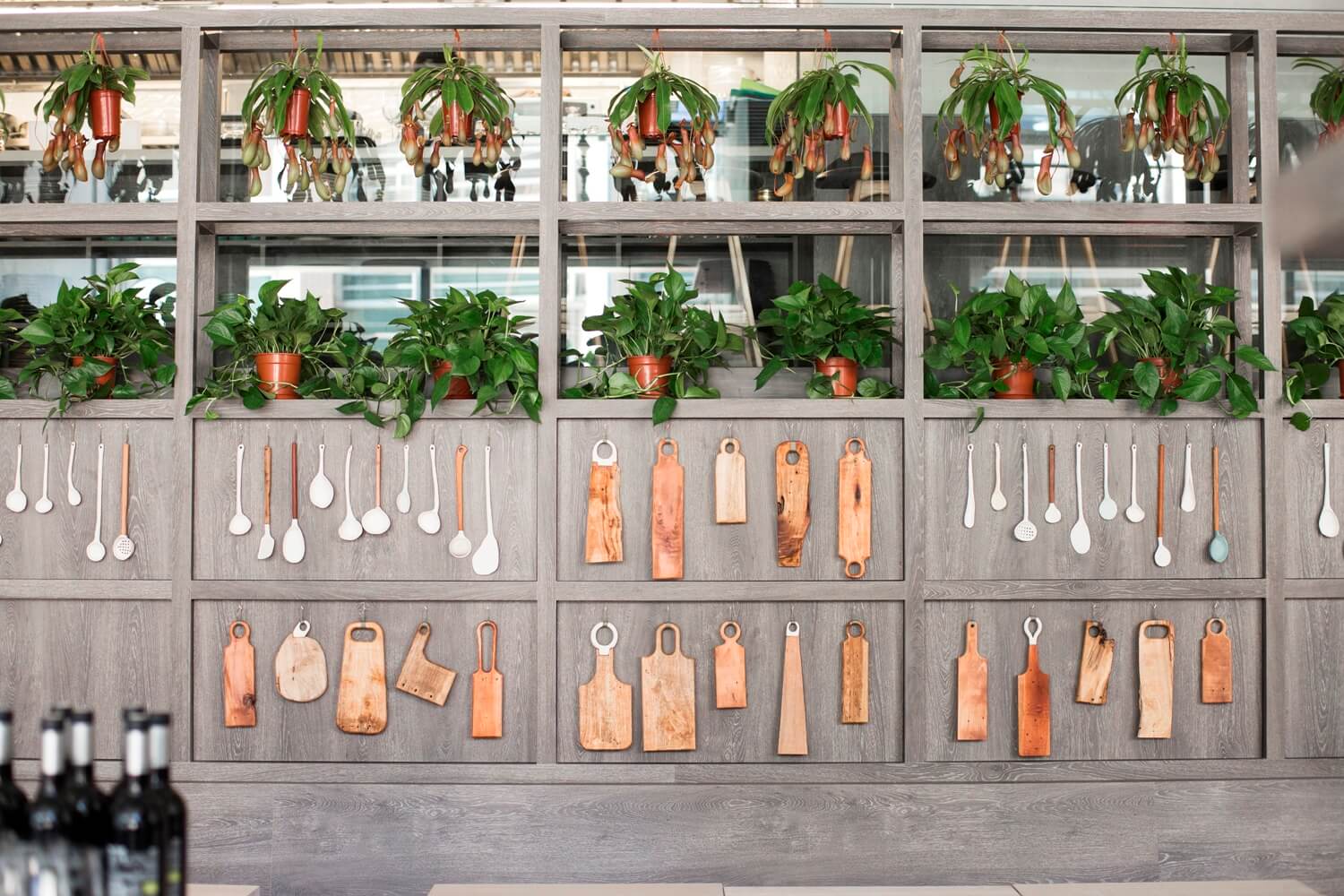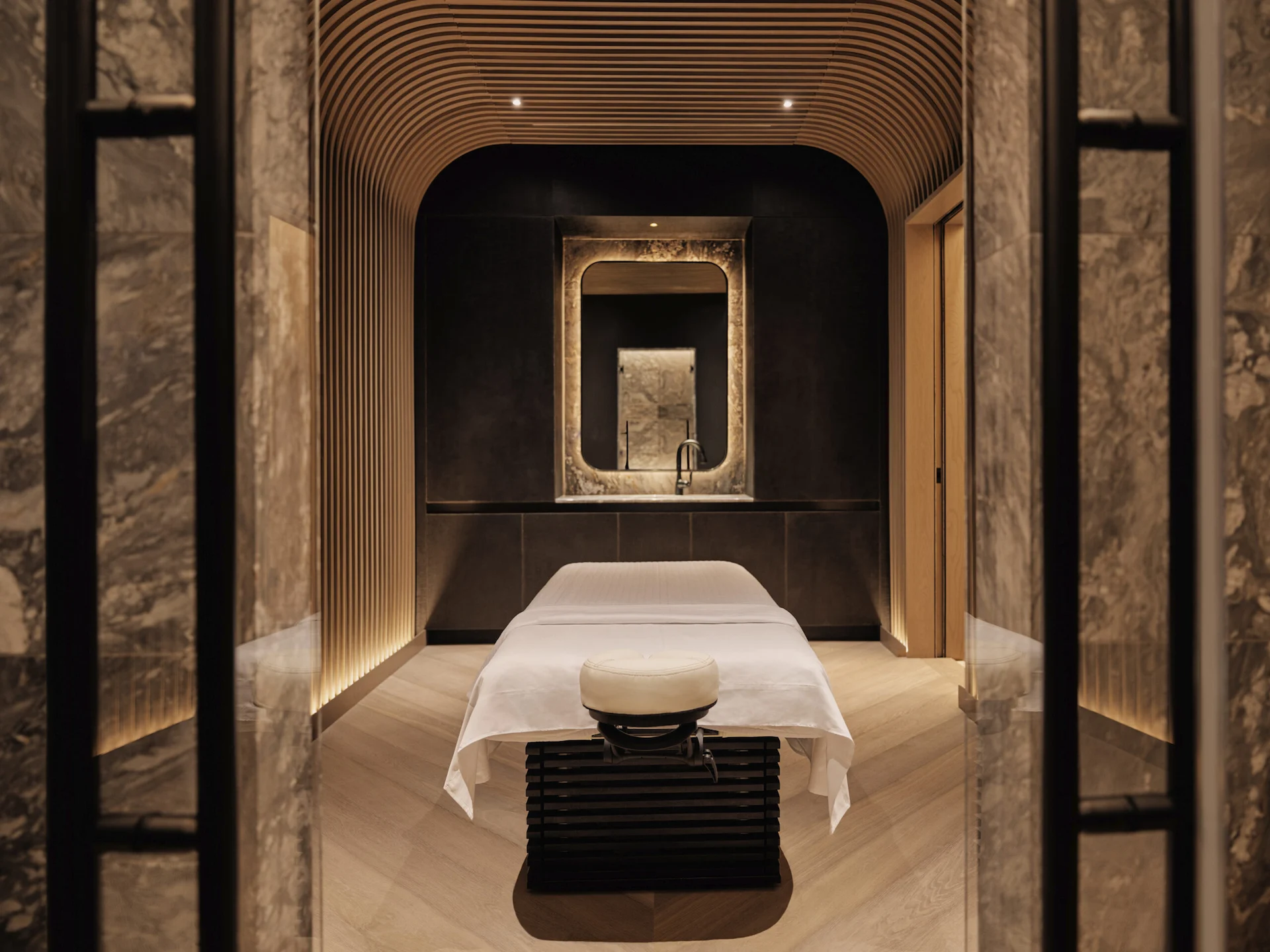Ten years ago, finding vegetarian dining options in Hong Kong could be tricky, never mind vegan or dietary-conscious options. Enter Grassroots Pantry Head Chef and Managing Director Peggy Chan: from a small casual restaurant in Sai Ying Pun, Peggy played a pivotal role in launching the plant-based food movement in Hong Kong, which has gained incredible momentum in the last three years with a whole cast of vegetarian, vegan and sustainable shops and restaurants popping up. Based in its current Hollywood Road location since 2015, Grassroots Pantry remains one of the key figures on the scene, showcasing that plant-based cuisine can be refined and elegant, too. Compare Retreats chat to Peggy about her own culinary roots, her new collaboration with Asphodel Crossfit, and the wellness rituals that keep her grounded.

Give us a quick introduction to yourself and the core concept of Grassroots Pantry. I’m the Head Chef and Managing Director of Grassroots Pantry, and I’ve worked in food and beverage for 18 years. When I was 16, I stopped eating red meat and slowly cut out poultry and fish, and became a conscious consumer. I went to culinary school in Canada, then hotel and business school in Switzerland, and arrived in Hong Kong in 2007 to work in corporate hotels. I wasn’t doing anything that felt natural to me, so that’s when I left corporate food and beverage and decided to do something that was meaningful and impactful.
How has your luxury corporate background informed the business model of Grassroots Pantry? When you surround yourself with beautiful things and good food, you tend to always have higher expectations. After I arrived in Hong Kong I worked at L’Atelier de Joël Robuchon which became three Michelin-starred, and then I was headhunted by Four Seasons, and then The Peninsula. I wanted to make Grassroots a dining experience that provided the quality you would expect at any five-star hotel. However, applying that experience is easier said than done. Even though you might have those standards and those expectations, your staff and others who represent your brand might not execute your visions the same way, so it eventually becomes a necessity to lead people to perform their best, rather than managing people to meet your expectations.
Fine dining is often very meat-focussed. What, if any, have been the challenges as a vegetarian fine-dining chef? I wouldn’t dare call myself a fine-dining chef, as our food is presented and priced pretty casual. I guess the challenges depends on your attitude towards facing challenges head-on. The experiences I had with other chefs training at Michelin-star restaurants, used to be quite negative when chefs would often refuse to cater to allergies or special dietary restrictions. It was common to see requests as a nuisance. But the industry is changing and it’s almost compulsory to have some form of vegan/vegetarian and gluten free dish on the menu nowadays.
Because of my general interest in the politics behind our food system, I was able to see customers’ special dietary needs as a result of our industry’s maltreatment and vague policy handling. If we decided overnight to not buy factory farm meats and boycott GMOs, we wouldn’t have customers facing food/diet related problems. So I think that to be a chef, we have to take a stand in our food choices and method of sourcing and to better accommodate.
Inside Grassroots Pantry on Hollywood Road | Image courtesy of Grassroots Pantry
How did you quietly start a plant-based revolution in Hong Kong? Before I came back to Hong Kong in 2007, I was already practising this type of lifestyle. I would go grocery shopping at farmers markets and buy bulk foods, grains and superfoods at ‘hippie stores’. There wasn’t anything in Hong Kong like that back then—JustGreen had barely opened. All you had were places like Three-Sixty which was crazy expensive and everything was packaged, so I asked myself, how do you make this type of lifestyle accessible and available to people? Whether there was a market for it at the beginning, I didn’t know, but I began to realise it was necessary. I started by getting involved in the farm-to-table movement. I started to visit farmers in the New Territories, and then I was invited to do some cooking classes with some ad-hoc workshops, conduct school talks and such, which got my name out a little bit.
Why do you use ‘plant-based’ to describe your food rather than vegan? When we were opening Grassroots Pantry back in 2011, one of the key documentaries that I watched was Planeat, directed and produced by my good friend Shelley Lee Davis. At the time, no one really knew about the plant-based movement in the U.S.A. That was the first time that I had heard the word ‘plant-based’, so when I created the branding for Grassroots I decided we wouldn’t use ‘vegan’ or ‘vegetarian’ in any of our marketing; the reason being, the word doesn’t always have positive connotations and can be a deterrent from people even trying it. That was purely a business strategy, but it’s also a reflection of the menu. My food needs to be first and foremost nutrient-dense, so that means it needs to be plant-protein rich, vitamin-rich, mineral-rich; and whole- meaning little to no processing involved. So I chose the word plant-based because vegan doesn’t always mean healthy for neither the earth or our bodies, but plant-based covers that fact that we source holistically, is purchased whole from clean sources, and our food is always seasonal and produce-driven.
Meat alternatives like Beyond, Impossible or OmniPork, have taken off in Hong Kong this year. What’s your take on them? As cleaner versions of the mock-meats we are used to seeing, I view meat alternatives as an opportunity to disrupt the fast food industry and to lessen the consumption, and therefore production of factory farmed animals. From a personal psychological and physiological perspective, the idea of consuming flesh and living beings is entirely remote to me, and therefore I will always choose whole foods and natural ingredients over processed ingredients. David Yeung is a great friend, and we did a pop up promotion for the Beyond Burger last November and prepared it in a brand new way, with the patties broken down and stuffed with fresh, Chinese ingredients like Sichuan peppers, mushrooms, and pickled greens, and served it with lotus root fries and a raw smokey ‘Yunnan ham’ cashew mayo.

The conversation around health food often focuses on Western cuisine, but your menu is very Chinese-focussed. How have you adapted these flavours for your plant-based ethos? I wanted to show people that vegetarian food is in all cultures. When people think of vegetarian Chinese food, it’s so easy to think of cornstarch, oils, thick sauces, mock-meat—we wanted to use local flavours and whole ingredients to freshen it up. For example, a fried rice dish, but laced with superfoods and using short grain brown rice instead. Or our Shaanxi Cold Noodle Salad: we use kelp and mung bean noodles, and add in extra protein through almond butter in the sesame sauce.
What is the key to creating a great team? I think it’s important to learn over time what works and what doesn’t for you, but to be a manager means that you really have to understand how to treat different people as individuals, and to apply different solution methods for different behaviours. As I said, I prefer to lead: to lead by example and by conviction. You’ll always have people whose intentions aren’t in the same place as yours—I used to be fearful of politics and confrontations, but now I just say whatever I feel. I will be upfront to an employee if they are wasting my time, and will base my assessment of someone first on attitude, and secondly on performance.
Could you tell us more about the plant-based collaboration between Asphodel Cross-fit gym? When the CrossFit Asphodel gym was planning to move to their new location in Kennedy Town, owners Cris and Vanessa asked if I would be interested in running a Grassroots Pantry shop there. At that point in time, I said, “No way”—I say no often, only because I wanted to focus on quality rather than quantity—but the opportunity arose about six months ago, and I decided we were ready to make it happen and expand. It’s an operation consulting and catering kind of collaboration: Grassroots Pantry is involved in how the kitchen is set up, the fit, the layout of the displays, and then one of our employees will be stationed there for three months to ensure everything operates smoothly. I don’t want us to compromise on quality, just because our food is being served in a box.
How do you make sure your food is nutritional and delicious? I’m not a nutritional scientist and I’ve never officially studied nutrition. Most of my cooking comes from instincts and experience—what do I eat when I feel ill, what to eliminate when I feel lethargic—whereas with the Asphodel collaboration I’ve been learning about how to calculate it, and also designing these meals with a purpose: what does a gym-goer or CrossFit athlete want in a meal? We’ve done all the nutritional calculations and labels, and every dish has been tweaked at least 15 times to ensure that everything is laced with vitamins, minerals, that it’s protein and fat rich, and that the calories are not over the top.

What are your favourite travel destinations for good food? Bali is definitely a great spot for raw food done right. I love the COMO Shambhala Estate in Ubud, their Glow restaurant is one of my favourite in the world. Middle Eastern food is incredible, so Istanbul in Turkey is another one of my favourite destinations: the markets there are just beautiful, and I love a little mezze platter. Melbourne is a fun place to visit for good food in general—I recently went to a place called Red Sparrow. It’s a vegan pizza joint and it’s not just best vegan pizza, but some of the best pizza I’ve ever had, seriously. It was so good.
Which healthy holidays and retreats do you particularly love? I used to do a cleanse or detox every three months, now I go just to relax and de-stimulate. During the first four or five years of operating Grassroots Pantry, I was constantly stressed and in my own head figuring things out, so checking out and staying at retreats was my haven. I love going to The Farm at San Benito, mainly because the food is great and I love doing the blood cell test: you check it before and after the retreat, and the difference is incredible. It really made me believe in raw foods and their healing purpose. Like I said, I love COMO Shambhala in Bali, which has some of the most beautiful rooms and pools I’ve ever seen. Recently, I’ve been going to more and more Six Senses: I went to the one in Ninh Van Bay in Vietnam, and twice at Yao Noi in Thailand—it has the best infinity pool. And Kamalaya: Karina Stewart is one of the best in Traditional Chinese Medicine. I love going somewhere I know I can get health and healing support.
Where are your favourite places in Hong Kong to be pampered? Two places. Four Seasons Spa, if I really want to be pampered where I usually book into the couples room with a friend. The other one—when I really want to check out and not talk to anyone or be recognised—is the Landmark Mandarin. They have the best steam room, and it smells great.

What restaurants in Hong Kong do you visit for special occasions? Cafe Gray is always one that I will go to. Recently I went to Haku, which was very special. Chef Agustin (Balbi) made a vegan menu for us, and that was great, it was his first time to try something veggie. I like to try new restaurants all the time, we went to Vea recently and Arcane as well. I really want to try Uwe down the road.
What are the wellness rituals that you use on a daily or weekly basis? Natural wine, that’s my wellness ritual—well part of it. I am constantly running on such high adrenalin that when I need to slow down at night, it’s hard to just stop and sleep: so I wind down the evening with natural wine that does not have added sulphites or preservatives. I also use essential oils for calming and grounding myself often, mostly Frankincense and Sandalwood. Jojoba oil or coconut oil are fantastic as body moisturisers. I also live on Young Living Panaway oil for pain relief when my muscles and tendons have been overworked.
Which conscious brands in Hong Kong do you like to support? When it comes to food, Green Common is a fantastic start to stock up on local brands like Happy Cow—as the first restaurant to have served the lime in the coconut and cherry amount fudge ice cream, we are super keen on supporting brands with ethos and practices aligned with ours. Coconut Matter for their coconut oils and coconut aminos, Raiz the Bar (RIP) was and still is in my memory, my favourite raw and vegan chocolate in the world, and Homegrown Foods our long-term partners for organic vegetable sourcing.




